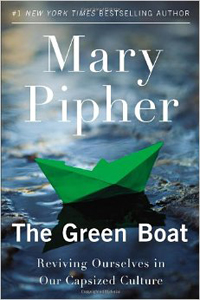Book Notes
 Mary Pipher, The Green Boat; Reviving Ourselves in Our Capsized Culture (New York: Riverhead Books, 2013), 237pp.
Mary Pipher, The Green Boat; Reviving Ourselves in Our Capsized Culture (New York: Riverhead Books, 2013), 237pp.
Mary Pipher, a clinical psychologist in Nebraska, has written nine books. She's best known for Reviving Ophelia: Saving the Selves Of Adolescent Girls (1994), which spent three years on the New York Times best seller list. In her newest book, she turns from the inner world of individuals to the outer world of the entire planet, and in particular the consequences of climate change. Although the two books deal with different subject matters, she says she wrote them for the same reason — to identify a unique cultural moment in which people feel overwhelmed, and move us to act to create a new paradigm.
The book's title refers to the boat-shaped piece of land where Pipher lives in Nebraska. It's a glorious ecosystem on a lake, but like so much of planet earth, it faces serious ecological dangers. Pipher's wake up call came when she read the book Eaarth by Bill McKibben. She said she felt "shell-shocked" by the harsh and pessimistic conclusions drawn by the famous environmentalist. But instead of wallowing in despair, Pipher became an activist in the climate change movement. The last half of the book describes her efforts to help create a coalition to fight the 2,000-mile TransCanada Keystone XL pipeline that would run through Nebraska.
The jury is still out on the fate of the pipeline. Her coalition has enjoyed some victories, but they also experienced the power of corporate wealth and political corruption. What Pipher learned, she says, is that our inner and outer worlds are deeply connected. "I have learned that reviving the planet and reviving ourselves are not opposed, but rather deeply congruent behaviors. Fixing inner and outer space are the same process. We can't heal ourselves without healing our environments, and we can't be mentally healthy when the green boat is sinking and we are pretending the trauma isn't happening" (214).


